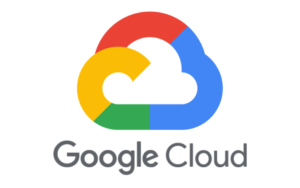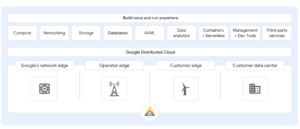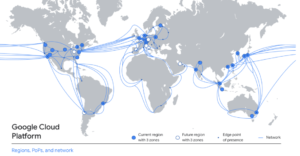

Google Cloud kicked off its Next ‘21 conference today with a torrent of news impacting a wide swath of its big data, advanced analytics, and AI offerings, including the unveiling of Google Distributed Cloud, a new data science notebook for Vertex AI, and the launch of Spark on Google Cloud, among others.
Let’s start with Google Distributed Cloud, which is a new portfolio designed to extend Google Cloud offerings to the edge and to customer and partner data centers. The offering will allow customers to run their Google Cloud services in a variety of places, including the 140+ Google network edge locations around the world, operator edges maintained by communication service providers (CSPs), and customers’ own data centers or edge locations.
Google Distributed Cloud is based on Anthos, Google Cloud’s platform for hybrid cloud computing, and eventually will encompass many of Google Cloud’s services (but obviously not Spanner, which requires specialized hardware and is available in a limited array of Google Cloud data centers around the world; see “Google Cloud Gives Spanner a PostgreSQL Interface” for Datanami’s exclusive coverage of Google Cloud’s Spanner news).
The first two products that Google Cloud is launching under the new banner are Google Distributed Cloud Edge and Google Distributed Cloud Hosted. Google Distributed Cloud Edge is aimed at bringing the expected influx of 5G radio traffic closer to customer applications like computer vision and Google AI edge inferencing applications, which will minimize latencies and maximize customer experience.
Sachin Gupta, vice president and general manager of Open Infrastructure at Google Cloud, says Google Distributed Cloud Edge will “5G-enable” the digital economy for services like ride sharing and food delivery.

Google Distributed Cloud will encompass a range of Google Cloud offerings (Image source Google Cloud)
“By moving these compute workloads closer to the user, together with our telco partners, we can reduce latency levels and offer a whole new range of mobile experiences that were simply not possible before,” he said during a press briefing last week.
Google Distributed Cloud Hosted, meanwhile, is designed for more sensitive workload that need to meet strict data residency, security, and privacy requirements. The offering does not require any connectivity to Google Cloud at any time to manage infrastructure, services, APIs, or tooling, the company says. Users will manage it via an Anthos control plane. It will be available in preview in the first half of 2022, Google says.
Google is partnering with two European companies to deliver Google Distributed Cloud Hosted as part of its “Cloud. On Europe’s Terms” initiative. That includes T-Systems, which is building a “sovereign cloud offering” for public sector organizations in Germany, and OVHCcloud, which is doing something similar in France.
The company also launched Vertex AI Workbench, a data science notebook offering to go along with Vertex AI, which it launched in May. The key aspect of Vertex AI Workbench is it works across all of Google Cloud’s offerings, including BigQuery, Dataproc, and Dataplex, said Gerrit Kazmaier, Google Cloud’s vice president and general manager of databases, data, analytics, and Looker.
“We‘ve seen an incredible increase in productivity, more than a five times increase in development productive, meaning reduced time of development because data scientist and data engineer do not need to context switch anymore,” Kazmaier said during the press briefing. “They have the same experience as they go across the full machine learning development lifecycle.”
Similarly, the company also announced Spark on Google Cloud. Currently in preview, the offering makes Spark “a premium offering on Google Cloud,” and is aimed primarily at data engineers, the company said. Spark on Google Cloud will be available to users regardless of whether they start in BigQuery, Dataproc, Dataplex, or Vertex AI, the company said.
The Mountain View, California company also announced the general availability of BigQuery Omni, the hybrid big data analytics offering it originally unveiled in July 2020. With BigQuery Omni, customers have the capability to use BigQuery to analyze data that’s residing in Google Cloud, AWS, and Microsoft Azure, without moving data sets.
The company also announced expanded partnerships with several vendors in the big data space. The partership with Tableau, for instance, will enable the visualization leader to access Looker’s semantic layer. Current Looker users will also be able to expand the semantic layer to Tableau. Google Cloud also said it was expanding work with Collibra, Informatica, Fivetran, and Databricks.
Google Cloud Next ’21 is taking place today through Thursday. Google Cloud CEO Thomas Kurian and Sundar Pichai, the CEO of Google and parent company Alphabet, will be kicking things off with a keynote this morning at 9 a.m. PT. See cloud.withgoogle.com/next for more information.
Related Items:
One on One with Google Cloud Product Director Irina Farooq
September 17, 2025
- Dynatrace Joins GitHub MCP Registry to Accelerate AI-Powered Developer Innovation
- LogicMonitor Sets New Standard for AI-First Observability with Edwin AI and Expanded Service Intelligence
- NASA Expands Access to Earth Data Through New Metadata Pipelines
- MongoDB Extends Search and Vector Search Capabilities to Self-Managed Offerings
- Gartner Says Worldwide AI Spending Will Total $1.5T in 2025
- Cohesity Extends Cyber Resilience Leadership with New Security Innovations and Partnerships
- Ataccama Opens Registration for FWRD 2025
September 16, 2025
- MongoDB Launches AI-Powered Application Modernization Platform to Reduce Technical Debt and Speed Innovation
- UC San Diego Plays Key Role in National Effort to Build a Fusion Research Data Platform
- NVIDIA Welcomes Data Guardians Network to Its Elite Startup Program
- Acceldata Survey Finds Persistent Gaps in Enterprise AI Data Readiness
- Exabeam and DataBahn Partner to Accelerate AI-Powered Security Operations with Smarter Threat Detection
- Domino Data Lab Achieves ISO 9001 and SOC 2 Type II With Zero Findings
- Qlik Open Lakehouse Now Generally Available, Giving Enterprises Rapid, AI-Ready Data on Apache Iceberg
- Expert.ai and Springer Nature Partner to Transform Clinical Trials with AI-Driven Intelligence and Deep Domain Expertise
- Denodo Expands AI Capabilities with Release of DeepQuery in Platform 9.3
- Indicium Receives Investment from Databricks Ventures
- DataOps.live Launches Major Upgrade to Deliver AI-Ready Data at Enterprise Scale
- Ethernet Alliance to Showcase Multivendor Live Demonstration at ECOC 2025
- Allot Leverages SnapLogic to Launch AI Agent to Highlight Health Inequalities in Pharma
- Inside Sibyl, Google’s Massively Parallel Machine Learning Platform
- What Are Reasoning Models and Why You Should Care
- Rethinking Risk: The Role of Selective Retrieval in Data Lake Strategies
- The AI Beatings Will Continue Until Data Improves
- Top-Down or Bottom-Up Data Model Design: Which is Best?
- Beyond Words: Battle for Semantic Layer Supremacy Heats Up
- Software-Defined Storage: Your Hidden Superpower for AI, Data Modernization Success
- What Is MosaicML, and Why Is Databricks Buying It For $1.3B?
- How to Make Data Work for What’s Next
- In Order to Scale AI with Confidence, Enterprise CTOs Must Unlock the Value of Unstructured Data
- More Features…
- Mathematica Helps Crack Zodiac Killer’s Code
- GigaOm Rates the Object Stores
- Promethium Wants to Make Self Service Data Work at AI Scale
- Databricks Now Worth $100B. Will It Reach $1T?
- Solidigm Celebrates World’s Largest SSD with ‘122 Day’
- AI Hype Cycle: Gartner Charts the Rise of Agents, ModelOps, Synthetic Data, and AI Engineering
- Data Prep Still Dominates Data Scientists’ Time, Survey Finds
- MIT Report Flags 95% GenAI Failure Rate, But Critics Say It Oversimplifies
- The Top Five Data Labeling Firms According to Everest Group
- Career Notes for August 2025
- More News In Brief…
- Seagate Unveils IronWolf Pro 24TB Hard Drive for SMBs and Enterprises
- Gartner Predicts 40% of Generative AI Solutions Will Be Multimodal By 2027
- DataSnap Expands with AI-Enabled Embedded Analytics to Accelerate Growth for Modern Businesses
- Acceldata Announces General Availability of Agentic Data Management
- Transcend Expands ‘Do Not Train’ and Deep Deletion to Power Responsible AI at Scale for B2B AI Companies
- Pecan AI Brings Explainable AI Forecasting Directly to Business Teams
- Databricks Surpasses $4B Revenue Run-Rate, Exceeding $1B AI Revenue Run-Rate
- Qlik Announces Canada Cloud Region to Empower Data Sovereignty and AI Innovation
- SETI Institute Awards Davie Postdoctoral Fellowship for AI/ML-Driven Exoplanet Discovery
- NVIDIA: Industry Leaders Transform Enterprise Data Centers for the AI Era with RTX PRO Servers
- More This Just In…







































